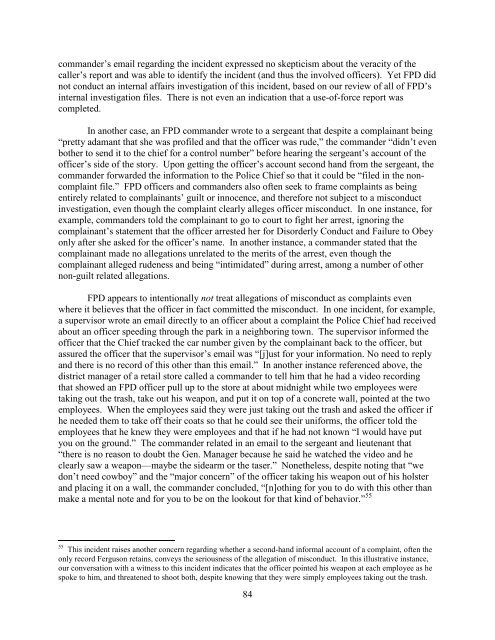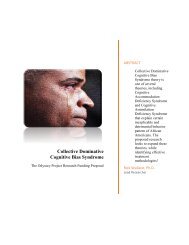U.S. Justice Department Report on the Ferguson Police Department
Ferguson’s law enforcement practices are shaped by the City’s focus on revenue rather than by public safety needs. This emphasis on revenue has compromised the institutional character of Ferguson’s police department, contributing to a pattern of unconstitutional policing, and has also shaped its municipal court, leading to procedures that raise due process concerns and inflict unnecessary harm on members of the Ferguson community.
Ferguson’s law enforcement practices are shaped by the City’s focus on revenue rather than by public safety needs. This emphasis on revenue has compromised the institutional character of Ferguson’s police department, contributing to a pattern of unconstitutional policing, and has also shaped its municipal court, leading to procedures that raise due process concerns and inflict unnecessary harm on members of the Ferguson community.
Create successful ePaper yourself
Turn your PDF publications into a flip-book with our unique Google optimized e-Paper software.
commander’s email regarding <strong>the</strong> incident expressed no skepticism about <strong>the</strong> veracity of <strong>the</strong><br />
caller’s report and was able to identify <strong>the</strong> incident (and thus <strong>the</strong> involved officers). Yet FPD did<br />
not c<strong>on</strong>duct an internal affairs investigati<strong>on</strong> of this incident, based <strong>on</strong> our review of all of FPD’s<br />
internal investigati<strong>on</strong> files. There is not even an indicati<strong>on</strong> that a use-of-force report was<br />
completed.<br />
In ano<strong>the</strong>r case, an FPD commander wrote to a sergeant that despite a complainant being<br />
“pretty adamant that she was profiled and that <strong>the</strong> officer was rude,” <strong>the</strong> commander “didn’t even<br />
bo<strong>the</strong>r to send it to <strong>the</strong> chief for a c<strong>on</strong>trol number” before hearing <strong>the</strong> sergeant’s account of <strong>the</strong><br />
officer’s side of <strong>the</strong> story. Up<strong>on</strong> getting <strong>the</strong> officer’s account sec<strong>on</strong>d hand from <strong>the</strong> sergeant, <strong>the</strong><br />
commander forwarded <strong>the</strong> informati<strong>on</strong> to <strong>the</strong> <strong>Police</strong> Chief so that it could be “filed in <strong>the</strong> n<strong>on</strong>complaint<br />
file.” FPD officers and commanders also often seek to frame complaints as being<br />
entirely related to complainants’ guilt or innocence, and <strong>the</strong>refore not subject to a misc<strong>on</strong>duct<br />
investigati<strong>on</strong>, even though <strong>the</strong> complaint clearly alleges officer misc<strong>on</strong>duct. In <strong>on</strong>e instance, for<br />
example, commanders told <strong>the</strong> complainant to go to court to fight her arrest, ignoring <strong>the</strong><br />
complainant’s statement that <strong>the</strong> officer arrested her for Disorderly C<strong>on</strong>duct and Failure to Obey<br />
<strong>on</strong>ly after she asked for <strong>the</strong> officer’s name. In ano<strong>the</strong>r instance, a commander stated that <strong>the</strong><br />
complainant made no allegati<strong>on</strong>s unrelated to <strong>the</strong> merits of <strong>the</strong> arrest, even though <strong>the</strong><br />
complainant alleged rudeness and being “intimidated” during arrest, am<strong>on</strong>g a number of o<strong>the</strong>r<br />
n<strong>on</strong>-guilt related allegati<strong>on</strong>s.<br />
FPD appears to intenti<strong>on</strong>ally not treat allegati<strong>on</strong>s of misc<strong>on</strong>duct as complaints even<br />
where it believes that <strong>the</strong> officer in fact committed <strong>the</strong> misc<strong>on</strong>duct. In <strong>on</strong>e incident, for example,<br />
a supervisor wrote an email directly to an officer about a complaint <strong>the</strong> <strong>Police</strong> Chief had received<br />
about an officer speeding through <strong>the</strong> park in a neighboring town. The supervisor informed <strong>the</strong><br />
officer that <strong>the</strong> Chief tracked <strong>the</strong> car number given by <strong>the</strong> complainant back to <strong>the</strong> officer, but<br />
assured <strong>the</strong> officer that <strong>the</strong> supervisor’s email was “[j]ust for your informati<strong>on</strong>. No need to reply<br />
and <strong>the</strong>re is no record of this o<strong>the</strong>r than this email.” In ano<strong>the</strong>r instance referenced above, <strong>the</strong><br />
district manager of a retail store called a commander to tell him that he had a video recording<br />
that showed an FPD officer pull up to <strong>the</strong> store at about midnight while two employees were<br />
taking out <strong>the</strong> trash, take out his weap<strong>on</strong>, and put it <strong>on</strong> top of a c<strong>on</strong>crete wall, pointed at <strong>the</strong> two<br />
employees. When <strong>the</strong> employees said <strong>the</strong>y were just taking out <strong>the</strong> trash and asked <strong>the</strong> officer if<br />
he needed <strong>the</strong>m to take off <strong>the</strong>ir coats so that he could see <strong>the</strong>ir uniforms, <strong>the</strong> officer told <strong>the</strong><br />
employees that he knew <strong>the</strong>y were employees and that if he had not known “I would have put<br />
you <strong>on</strong> <strong>the</strong> ground.” The commander related in an email to <strong>the</strong> sergeant and lieutenant that<br />
“<strong>the</strong>re is no reas<strong>on</strong> to doubt <strong>the</strong> Gen. Manager because he said he watched <strong>the</strong> video and he<br />
clearly saw a weap<strong>on</strong>—maybe <strong>the</strong> sidearm or <strong>the</strong> taser.” N<strong>on</strong>e<strong>the</strong>less, despite noting that “we<br />
d<strong>on</strong>’t need cowboy” and <strong>the</strong> “major c<strong>on</strong>cern” of <strong>the</strong> officer taking his weap<strong>on</strong> out of his holster<br />
and placing it <strong>on</strong> a wall, <strong>the</strong> commander c<strong>on</strong>cluded, “[n]othing for you to do with this o<strong>the</strong>r than<br />
make a mental note and for you to be <strong>on</strong> <strong>the</strong> lookout for that kind of behavior.” 55<br />
55 This incident raises ano<strong>the</strong>r c<strong>on</strong>cern regarding whe<strong>the</strong>r a sec<strong>on</strong>d-hand informal account of a complaint, often <strong>the</strong><br />
<strong>on</strong>ly record Fergus<strong>on</strong> retains, c<strong>on</strong>veys <strong>the</strong> seriousness of <strong>the</strong> allegati<strong>on</strong> of misc<strong>on</strong>duct. In this illustrative instance,<br />
our c<strong>on</strong>versati<strong>on</strong> with a witness to this incident indicates that <strong>the</strong> officer pointed his weap<strong>on</strong> at each employee as he<br />
spoke to him, and threatened to shoot both, despite knowing that <strong>the</strong>y were simply employees taking out <strong>the</strong> trash.<br />
84

















